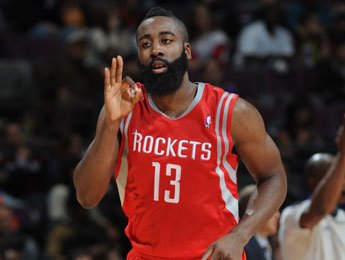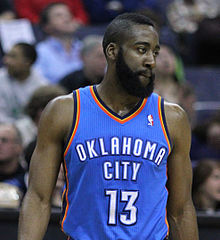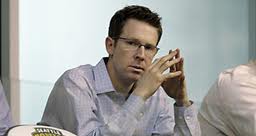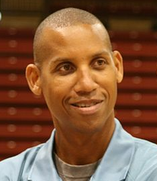
 The concept of payback often results in conflicting feelings. Revenge at its worst could be considered a character defect and something you would not teach your kids.
The concept of payback often results in conflicting feelings. Revenge at its worst could be considered a character defect and something you would not teach your kids.
But in the right context, proving someone made a mistake – payback – and doing it with class, can be delightfully rewarding.
Although it likely occupies only a tiny part of his daily thought process, you have to believe that on occasion, when alone, James Harden looks at the NBA standings and salivates at the possibility. There it was again on Saturday morning:
Western Conference standings: Second place: Oklahoma City Thunder Seventh place: Houston Rockets First round matchup: Priceless Getting Harden to admit he’d love such a matchup would be equivalent to convincing him he’d look better in a goatee. But if he’s not openly looking forward to it, that’s OK. The rest of us can drool over the possibility. Check that – the rest of us excluding fans in Oklahoma City, who have to wonder if their young team that has advanced every season can take that final step. Since arriving from Seattle in 2008, the Thunder have steadily grown – 23 victories the first year, 50 victories and a first round playoff loss the next, 55 victories and a loss in the 2011 Western Conference finals, and finally a trip to the NBA Finals, where they lost 4-1 to Miami last season.NBA history is replete with teams that made the slow climb to a championship team – the Pistons of the ‘80s, Michael Jordan’s Bulls, the Rockets of the ‘90s, Kobe’s Lakers after Shaq left.
All suffered setbacks, but kept building and eventually won titles. The Thunder seemed destined to follow in that path.
 But a desire to limit their luxury tax led the Thunder to the decision to trade Harden. They offered him a substantial amount of money – a reported $54 million. But Harden eventually got $80 million from the Rockets. The figures are so astronomical that it’s tempting to say, “isn’t $54 million enough?” Then again, if you managed to spend your way through $54 million, it’s always nice to have another $26 million to fall back on.
But a desire to limit their luxury tax led the Thunder to the decision to trade Harden. They offered him a substantial amount of money – a reported $54 million. But Harden eventually got $80 million from the Rockets. The figures are so astronomical that it’s tempting to say, “isn’t $54 million enough?” Then again, if you managed to spend your way through $54 million, it’s always nice to have another $26 million to fall back on.
It was within the Thunder’s power, however, to retain Harden. They let him go not because he had a poor NBA Finals (16-of-48 from the field, 12.4 points per game, three games single-figure scoring) and not because of any shortcoming on the floor; they made a business decision to let him go.
For several years now with Kevin Durant as the franchise player and Russell Westbrook and Harden as budding complementary superstars, the Thunder has been a team praised by many. Eventually, it was often written and said, the question was not when they would get their first NBA title, but how many championships they would win.
History tells us that besides those teams that have built slowly and inexorably towards a title, there is also a significant list of teams that got close and never won a championship.
 Think of Reggie Miller’s Pacers, who got to the NBA Finals in 2000, lost to the Lakers and never returned. The next year, it was Allen Iverson’s 76ers – one trip to the Finals and never again. The Orlando Magic have come close in two eras – 1995 with Shaq and 2009 with Dwight Howard. Each time they lost and never got a chance to be in the Finals again with the same team.
Think of Reggie Miller’s Pacers, who got to the NBA Finals in 2000, lost to the Lakers and never returned. The next year, it was Allen Iverson’s 76ers – one trip to the Finals and never again. The Orlando Magic have come close in two eras – 1995 with Shaq and 2009 with Dwight Howard. Each time they lost and never got a chance to be in the Finals again with the same team.
Seattle in 1996, the Knicks in 1994, the Suns in 1993. All got there once and did not return.